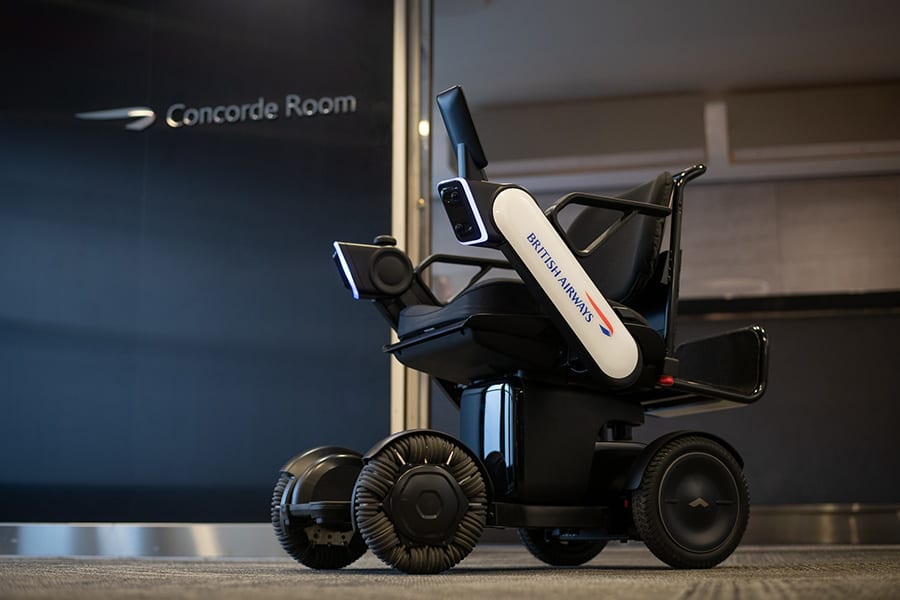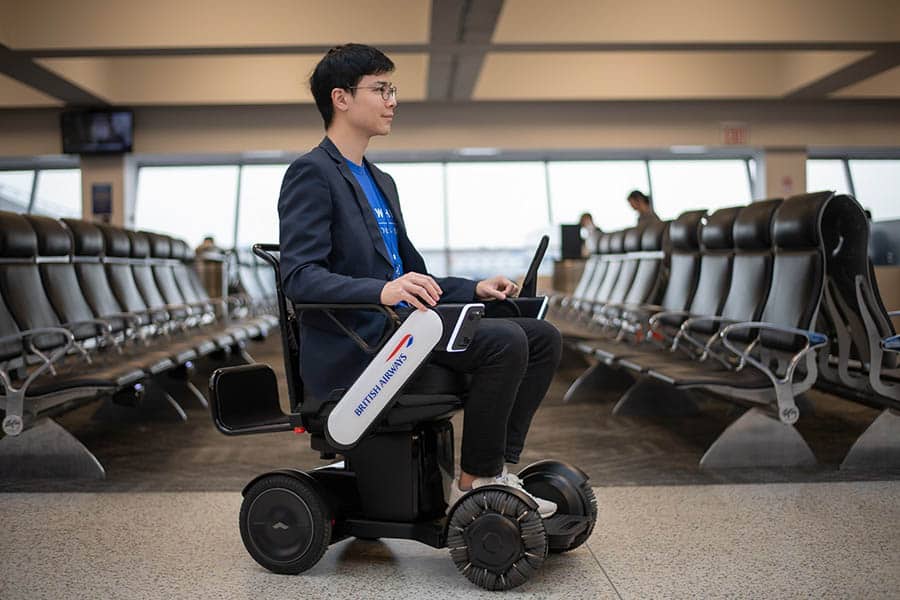British Airways embraces self-driving powerchair concept as trial planned for UK
Having trialled its autonomous powerchairs in numerous international airports, WHILL has worked with British Airways to test the concept in America’s JFK Airport – the sixth-busiest airport in the United States.
The trial saw the fully autonomous vehicles used at JFK Airport to help customers navigate the airport terminal freely as WHILL’s Mobility-as-a-Service (MaaS) model continues to grab the attention of airlines and airports globally.
In November 2019, the Japanese powerchair manufacturer confirmed its first trial at Tokyo’s Haneda Airport before testing the concept in North America.
The devices, which were exclusively trialled by British Airways customers at New York’s JFK Airport, were equipped with anti-collision technology and allowed customers to set their preferred destination anywhere within the airport.
Sensors enabled the chairs to navigate obstacles safely throughout the terminal without assistance from users, travel companions or airport support teams, providing users with more independence and freedom.
Users of the powerchairs were able to change their desired destination within the airport as many times as they wished on their way to the boarding gate. Once they reached the gate, the users disembarked the devices which then drove themselves back to their charging station, ready for the next user.
According to British Airways, the trial is one of a number of initiatives to encourage more customers with disabilities to travel, with the airline having seen customer satisfaction more than double for travellers with accessibility needs following the creation of a specialist accessibility team.
It forms part of its £6.5 billion investment programme for customers.
Following the trial in North America, British Airways’ Head of Innovation Ricardo Vidal said the concept will now make its way to the UK.
“Our customers tell us they would like greater independence and control over their journey through the airport, so we were keen to trial autonomous devices and see our customers response to the very latest mobility technology in a real airport environment,” he commented.
“Over the next few months, we will be collaborating on a further trial at our busy home hub at Heathrow Terminal 5 to gather more feedback and explore the introduction of this technology alongside our team of customer service professionals to provide a truly seamless and accessible airport experience. I’m excited about the future of inclusive innovation to support the accelerating demand for accessible air travel.”
The iconic British airline highlighted that almost half a million customers of its customers require additional assistance when they fly with British Airways each year, adding that the number is set to rise by 10 per cent by 2021.
In a CAA report last year, it revealed the number of disabled passengers travelling by air in the UK reached a record high between April 2018 and March 2019.
Across the aviation industry, accessibility has risen on the agenda over recent months with the International Air Transport Association (IATA) hosting its inaugural Global Accessibility Symposium last year. Also, in February, Heathrow appointed Helen Dolphin MBE and Keith Richards as co-chairs of the Heathrow Access Advisory Group (HAAG) as it looks to invest £30 million in accessibility tech.
Most recently, mobility scooter supplier TGA Mobility introduced its mobility scooter passport & flight checklist to improve the process of checking-in and travelling with powered mobility devices on planes – the first of its kind in the UK.
https://thiis.co.uk/british-airways-embraces-self-driving-powerchair-concept-as-trial-planned-for-uk/https://thiis.co.uk/wp-content/uploads/2020/03/British-Airways-WHILL-powerchair.jpghttps://thiis.co.uk/wp-content/uploads/2020/03/British-Airways-WHILL-powerchair-150x150.jpgNewsroomSupplier NewsTrade Newsautonomous,British Airways,CAA,checklist,Haneda Airport,IATA,JFK Airport,North America,passport,powerchair,scooter,TGA Mobility,Tokyo,United States,wheelchair,WHILLHaving trialled its autonomous powerchairs in numerous international airports, WHILL has worked with British Airways to test the concept in America’s JFK Airport - the sixth-busiest airport in the United States. The trial saw the fully autonomous vehicles used at JFK Airport to help customers navigate the airport terminal freely...Calvin BarnettCalvin Barnettcalvin.barnett@bhta.comAuthorTHIIS Magazine



